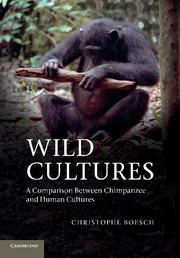Book contents
- Frontmatter
- Contents
- Acknowledgments
- Introduction
- 1 Studying culture in the wild
- 2 From human culture to wild culture
- 3 Shaping nature into home
- 4 One for all and all for one
- 5 I want to have sex with you
- 6 Learning culture
- 7 Dead or alive? Towards a notion of death and empathy
- 8 Wild culture – wild intelligence
- 9 Uniquely chimpanzee – uniquely human
- Epilogue: Will we have the time to study chimpanzee culture?
- References
- Index
Introduction
Published online by Cambridge University Press: 05 October 2012
- Frontmatter
- Contents
- Acknowledgments
- Introduction
- 1 Studying culture in the wild
- 2 From human culture to wild culture
- 3 Shaping nature into home
- 4 One for all and all for one
- 5 I want to have sex with you
- 6 Learning culture
- 7 Dead or alive? Towards a notion of death and empathy
- 8 Wild culture – wild intelligence
- 9 Uniquely chimpanzee – uniquely human
- Epilogue: Will we have the time to study chimpanzee culture?
- References
- Index
Summary
Humans descended from the apes! My dear, let us hope that it is not true, but if it is, let us pray that it will not become generally known.
The wife of the Bishop of Worcester, after learning about Darwin’s theory of evolution (1860).A Man without culture resembles a zebra without stripes
African ProverbIn the 1600s, the “civilized world” was horrified to learn that there were barbarians in the Americas practicing cannibalism. However, the French philosopher Michel de Montaigne said: “There is nothing barbarian and savage in this nation, according to what I have been told, except that each of us call barbarian what is not in our habits; to be honest, it seems that we have no other reference of truth and reason than the example and idea of the opinions and habits of the country we come from. That country always has perfect religion, the perfect police, the perfect and accomplished usage of things.” In other words, Montaigne was reminding his contemporaries that western values are not universal and that we need to understand other cultures before judging them. He also provocatively suggested that it might be less barbarous to eat someone who was already dead than to dismember someone who was still alive (a practice that westerners had been doing for centuries in the name of civilized justice).
Humans are the only animals on Earth that have composed musical pieces like “La Traviata” and “Don Giovanni,” painted works of art like the “Joconda,” cooked food using a variety of energy sources, invented computers, constructed skyscrapers, and travelled to the moon. At the same time, different groups of humans also wear very different clothing, have developed very different eating habits, and use many different languages and types of social greeting. This must not be forgotten in our discussion about the evolution of culture. Culture here is defined as all socially learned behavior that distinguishes individuals belonging to one group from individuals belonging to other groups. At the same time, let us be candid for a moment; I have never done anything even remotely close to composing “Don Giovanni,” I have never painted a work of art, and I have no idea what is inside the computer I am writing this on. And the same is probably true for most of us.
- Type
- Chapter
- Information
- Wild CulturesA Comparison between Chimpanzee and Human Cultures, pp. 1 - 8Publisher: Cambridge University PressPrint publication year: 2012



